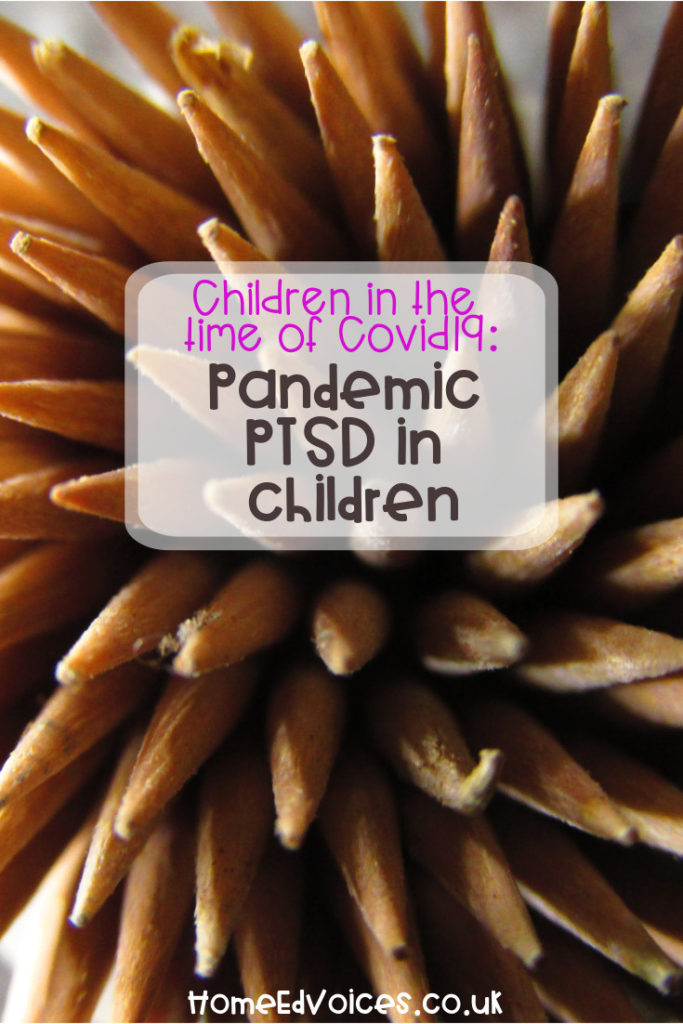Children in the time of Covid19: Pandemic PTSD in children

Next week is a really big week for us. My children are going swimming. Ballet and bushcraft, archery and gymnastics begin anew. And we have signed up for ALL.OF.IT.
Meanwhile, my good friends have signed up for nothing but online classes and are planning regular outdoor-only playdates. I also know another home ed mum who is so disheartened by that scenario that she’s seriously considering putting her kids back in school.
But then there are those families who have removed their children from school in favour of home ed, for now…
What is going on? Is it all down to conflicting information and poor guidance? I don’t think so.
Challenging PTSD behaviours
My Miss Seven has really taken to the calendar since lockdown measures began lifting. She always wants to know when she will see her grandparents again so she can start counting down. She can’t be torn from them without a new date to put on the calendar. The date on the calendar soothes her.
Over the summer, we saw a friend of hers we hadn’t seen for five months. Miss Seven was worried they might not have things in common anymore…that this friend wouldn’t like her after all this time. She was so anxious she spent the car journey chewing the inside of her bicep. By the time we got there it was an awful purple mess that broke my heart. She now has a chewy necklace.
One of my friends’ daughter is so full of anxiety for family members who have been ill with non-covid bugs over this period that she harms herself as a distraction and relief from her big feelings. I lent her one of our chewy necklaces. I hope it helps. But I don’t know that we will see a lot of them anytime soon given her daughter’s fears and our ‘cavalier’ partaking of every activity.
Except it’s not cavalier. Our daughters are exhibiting similar behaviours but over different trauma triggers. My friend’s daughter is a young teen. She is more worldly and rightly concerned by risk of infection. My daughter is so young and really only traumatised by the loss of social connection. What they need to feel safe are two very different things.
Suggestions for supporting PTSD
Children are already showing pandemic PTSD symptoms due to the sudden loss of routine, social contact and regular education. Children are now at increased risk of anxiety and depression. BAME children and child-carers are yet more likely to experience reduced mental health. And I’m not even going to dive into the deep scary pool of serious trauma inflicted on SEN children who are regressing in their development, poor children who are falling behind in education, children who are being abused at home or who are going hungry without school meals. For most of us, our children’s trauma pales in comparison, but that doesn’t invalidate their suffering.
The Children’s Trust conducted the study of pandemic PTSD symptoms and they recommend the following to combat future risk of anxiety and depression:
- Time outdoors with other children
- Time to play – this can be so therapeutic, especially if you can play with them!
- Support youth centres, schools, libraries and social clubs – even if your child isn’t ready for these yet, they may be invaluable to your child as they navigate their trauma in future
- Connect with friends, even if it must be online
- Build a new routine
- Communicate with your child and help them manage their worries and their expectations
- Build mental resilience with your child through problem solving, growth mindset and positive outlook
- Stay active
- Encourage kindness
For some families, this list is only achievable with a return to school or a return to something like ‘normal’ while for others this list is most achievable by staying home and sticking with what’s been working so far. The important thing is making sure our children feel they have some agency over their lives or support in taking steps to improve their emotional wellbeing. They must be allowed to take actions that mitigate emotions that threaten to overwhelm them. They must be able to choose their route to safety or risk feeling powerless and helpless.
Encourage kindness
The wide range of choices being made this September is a reflection of the diversity of our children and the different ways we feel we can empower them to heal from this shock to the system. Covid19 isn’t going anywhere anytime soon. But even if the virus disappeared tomorrow, even if we returned to ‘normal’ instantly, the effects of lockdown would be with our children for some years to come.
It is important that we are kind to each other at this time. We are all making difficult decisions to help our unique children feel most safe. We all have children who may be feeling anxious and exhibiting some challenging behaviours. It’s all part of the process of healing.
Knowledge is power. If your child is still anxious about Covid19, Daksina’s unit study may pave the way for empowering conversation.